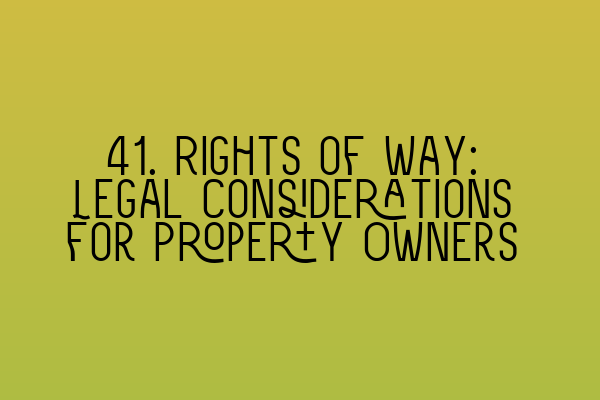41. Rights of Way: Legal Considerations for Property Owners
Introduction:
As property owners, it is crucial to understand the legal considerations surrounding rights of way. Whether you are looking to purchase a property, negotiate access with neighbors, or resolve a dispute, having a firm grasp of this area of property law is essential. In this article, we will explore the key aspects of rights of way, providing you with valuable insights to navigate these legal complexities.
What are Rights of Way?
Rights of way refer to the legal right to pass through or use someone else’s property. They can be granted through agreements, imposed by law, or established by historical use. These rights can apply to various situations, such as footpaths, driveways, or shared access to common areas.
Understanding Easements:
Rights of way are typically classified as easements, which are legal rights granted to individuals or entities to use land that they do not own. Easements are non-possessory interests, meaning they do not give the easement holder ownership of the property. Instead, they provide the right to use the land in a specified manner.
Types of Rights of Way:
Rights of way can be categorized into different types based on their origin or nature. Here are a few common ones:
1. Express Easements: These rights of way are explicitly granted through a written agreement between the property owner and the holder of the easement. For example, a developer may grant a neighboring property owner a right of way to access a public road.
2. Easements by Necessity: These arise when a property owner needs access to their land via another property, and it is deemed necessary by the court. For instance, if a landlocked property has no direct access to a road, the court may grant an easement by necessity over a neighboring property.
3. Prescriptive Easements: A prescriptive easement is acquired through continuous, open, and uninterrupted use of another’s property for a statutory period. This means that if someone has been using a particular path across your land for a long time without objections, they may have acquired a prescriptive easement.
Legal Considerations for Property Owners:
As a property owner, there are several legal considerations you need to be aware of regarding rights of way. Here are a few important points to remember:
1. Affect on Property Value: When purchasing a property or dealing with rights of way, it is crucial to consider the impact on the property’s value. Depending on the nature of the easement, it may limit your ability to develop, use, or sell your property.
2. Obtaining Professional Advice: Before entering into any agreements involving rights of way, it is advisable to seek legal advice. A solicitor specializing in property law can guide you through the intricacies and ensure your rights are protected.
3. Documentation and Title Search: Conducting a thorough title search is essential to identify any existing rights of way on the property you intend to purchase. This will help you understand your obligations and potential restrictions.
4. Negotiating Access: If you find yourself needing to negotiate access with your neighbors or other property owners, being open to discussions and exploring mutually beneficial solutions is recommended. Engaging in mediation or alternative dispute resolution methods can help resolve any conflicts amicably.
5. Resolving Disputes: Disputes relating to rights of way can arise, whether it’s an issue over the scope of the easement, alleged misuse, or disagreement on maintenance responsibilities. In such cases, it may be necessary to seek legal assistance to resolve the dispute effectively.
Conclusion:
Rights of way play a significant role in property law and can have a profound impact on property ownership and use. As property owners, it is imperative to understand the legal considerations surrounding rights of way and protect your rights. By seeking professional advice, conducting thorough research, and engaging in open communication, you can navigate the complexities of rights of way and ensure a smooth property ownership experience.
For more information on relevant legal topics, check out these related articles:
– SQE 1 Practice Exam Questions
– SQE 1 Practice Mocks FLK1 FLK2
– SQE 2 Preparation Courses
– SQE 1 Preparation Courses
– SRA SQE Exam Dates
